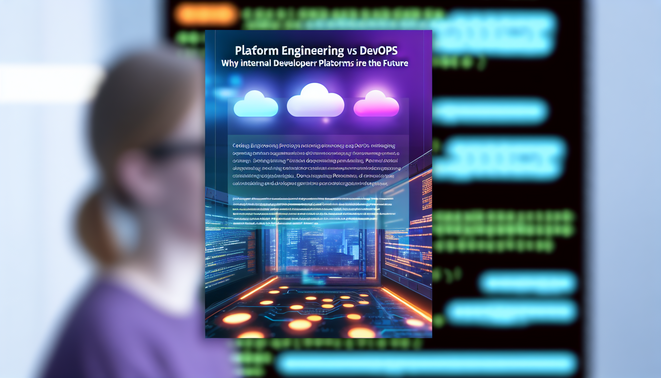“`html
Introduction: Defining Platform Engineering and DevOps
Platform Engineering and DevOps are pivotal concepts in modern software development, working synergistically to enhance software delivery and operational efficiency. Platform Engineering focuses on the design and development of the underlying systems that support software applications. It creates centralized frameworks that enable development teams to build, test, and deploy applications more efficiently. By abstracting and automating infrastructure management, Platform Engineering reduces the complexities of deployment and allows developers to concentrate on writing code rather than managing infrastructure details. This approach not only accelerates the development process but also ensures greater consistency and reliability in application performance.
On the other hand, DevOps is a cultural and professional movement that fosters collaboration between software development (Dev) and IT operations (Ops). It emphasizes communication, integration, and automation throughout the software development lifecycle. By implementing DevOps practices, organizations can significantly improve their productivity, reduce deployment failures, and achieve faster time-to-market for new features and updates. The integration of continuous integration and continuous deployment (CI/CD) practices is a hallmark of DevOps, facilitating rapid and safe releases.
Together, Platform Engineering and DevOps represent a fundamental shift in how organizations approach software development, enabling teams to deliver high-quality software rapidly while maintaining operational stability. Their significance lies not just in the tools and processes they promote, but also in the cultural transformations they inspire within technology teams, ultimately driving innovation and efficiency in the fast-evolving digital landscape.
The Rise of Internal Developer Platforms (IDPs)
The adoption of Internal Developer Platforms (IDPs) has accelerated remarkably as organizations recognize their potential to streamline processes and enhance developer autonomy. IDPs provide a structured framework that integrates tools, environments, and guidance tailored for developers, allowing them to focus on coding without the overhead of manual infrastructure management.
One significant advantage of IDPs is the reduction in friction during the development lifecycle. With automated deployment pipelines and self-service capabilities, developers can spin up environments and services rapidly, facilitating a more agile response to business needs. According to a recent report by ThoughtWorks, organizations that implement IDPs have seen a 30% increase in team productivity, largely attributed to fewer bottlenecks in project workflows.
Furthermore, IDPs empower developers by providing them with a sense of ownership over their work. This autonomy is crucial in today’s fast-paced tech landscape, where the ability to innovate and iterate quickly can be a competitive differentiator. A survey conducted by CloudBees highlights that 70% of developers feel more motivated when they have access to tools that enable independent deployment and self-service capabilities.
As organizations continue to embrace remote work and distributed teams, IDPs are set to play a key role in ensuring seamless collaboration across locations. By leveraging these platforms, companies can maintain consistent development environments and processes, enhancing both efficiency and compliance. For further insights into modern technology trends, you can explore our article on the rise of community-driven gaming platforms, which shares parallels in leveraging user autonomy and collaboration.
Platform Engineering vs. DevOps: Understanding the Differences
Platform Engineering and DevOps are both integral to modern software development, yet they focus on different aspects of the engineering process, making each vital in its own right.
Objectives: Platform Engineering aims to create and maintain a reliable, scalable infrastructure that fosters efficient development and deployment. It provides a self-service platform that minimizes friction for developers, focusing on the tools and services that enhance the developer experience. In contrast, DevOps is a cultural and operational philosophy that bridges the gap between development and operations. Its primary objective is to shorten the development lifecycle, increase deployment frequency, and ensure more dependable releases in alignment with business objectives.
Methodologies: Platform Engineering employs practices such as Infrastructure as Code (IaC), automated provisioning, and continuous integration/continuous deployment (CI/CD) to streamline operations. By focusing on architecting cloud-native solutions, it simplifies the processes that developers use to build applications. DevOps, while it also utilizes CI/CD and automated testing, emphasizes collaboration, communication, and integration between development teams and operations. This approach often includes practices like version control, agile methodologies, and shift-left testing, aiming to foster a culture of shared responsibility for software’s lifecycle.
Impact on Developer Experience and Organizational Efficiency: Platform Engineering enhances developer experience by offering tools and platforms that allow developers to focus on writing code rather than managing infrastructure. This can lead to higher productivity levels and greater job satisfaction among developers. By providing streamlined workflows, organizations can deploy updates and features faster, improving overall efficiency. On the other hand, DevOps impacts organizational performance by breaking down silos between teams, leading to faster problem resolution and innovation. According to the State of DevOps 2021 report, companies that adopt DevOps practices experience 24x faster recovery from failures and 280x more frequent deployments than those who do not.
In summary, while both Platform Engineering and DevOps aim to optimize software development processes, they focus on different goals and methodologies, ultimately driving improvements in developer experience and organizational efficiency in distinct ways.
Key Trends Shaping the Future: Automation and AI Integration
The evolution of Platform Engineering is increasingly being shaped by key trends such as automation, AI integration, and a focused emphasis on enhancing developer experience. Automation is streamlining processes, allowing teams to build, test, and deploy software more efficiently. For instance, DevOps tools now incorporate automated workflows that reduce manual tasks, thus speeding up the software development lifecycle.
AI is also playing a crucial role by providing predictive insights and optimizing decision-making in development processes. This integration not only enhances productivity but also fosters innovation. AI-driven development tools are enabling developers to focus on creative problem-solving rather than on routine tasks, significantly improving the overall developer experience.
Moreover, as the industry shifts towards more agile frameworks, the importance of a seamless developer experience cannot be overstated. Tools and platforms that prioritize usability, collaboration, and learning opportunities are becoming essential for attracting and retaining top-tier talent. This evolving landscape suggests that organizations which invest in these technologies and practices will have a competitive edge in the future of software development.
For further insights on evolving practices, check out our article on the rising trends in gaming or explore our guide on technical analysis for a related perspective.
Conclusion: The Path Forward in Software Development
The adoption of Internal Developer Platforms (IDPs) is reshaping the software development landscape, fostering not just efficiency but also transforming organizational culture. A key takeaway is that IDPs empower developers by providing them with self-service access to the resources and tools needed to build and deploy software quickly. This leads to enhanced productivity and reduced bottlenecks, as teams can operate more autonomously without excessive reliance on IT.
Moreover, IDPs promote a culture of collaboration and innovation. By simplifying the deployment process, teams can experiment with new ideas and technologies without fear of high-stakes failures. This shift contributes to a more agile environment, encouraging continuous learning and adaptation. As organizations embrace these platforms, they also foster inclusivity, allowing non-developers to contribute more significantly to software projects, thereby creating a diverse range of perspectives and solutions.
Looking ahead, the impact of IDPs is poised to drive organizations towards a more DevOps-centric approach. This aligns with the industry’s increasing emphasis on speed, flexibility, and cross-functional teamwork. Companies adopting IDPs are likely to see improved employee satisfaction, as developers gain more control over their workflows and outcomes, paving the way for a more innovative and resilient organizational framework.
In summary, the transition towards Internal Developer Platforms reflects a broader evolution within software engineering, promoting efficiency, collaboration, and forward-thinking organizational cultures. As this trend continues, it will crucially influence the speed and quality of software delivery in the future. For more insights into software evolution, check out our articles on related topics such as the impact of gaming on software development here.
Sources
- CloudBees – Internal Developer Platforms: What are their benefits?
- DevOps.com – The Future of Internal Developer Platforms 2023
- DevOps.com – The State of DevOps Report 2021
- ThoughtWorks – Internal Developer Platforms: What are their benefits?
“`




